Using Personalized Health Programs Instead of Generic Wellness Apps

Rethinking Wellness in the Digital Age
As the landscape of health and wellness evolves, personalized health programs are emerging as more effective and engaging alternatives to traditional, generic wellness apps. Leveraging advanced technology, individualized data, and behavioral insights, these tailored solutions promise to transform health management from one-size-fits-all to patient-centered care, with demonstrable benefits across various health domains, especially cardiovascular health.
Understanding How Personalized Health Programs Operate
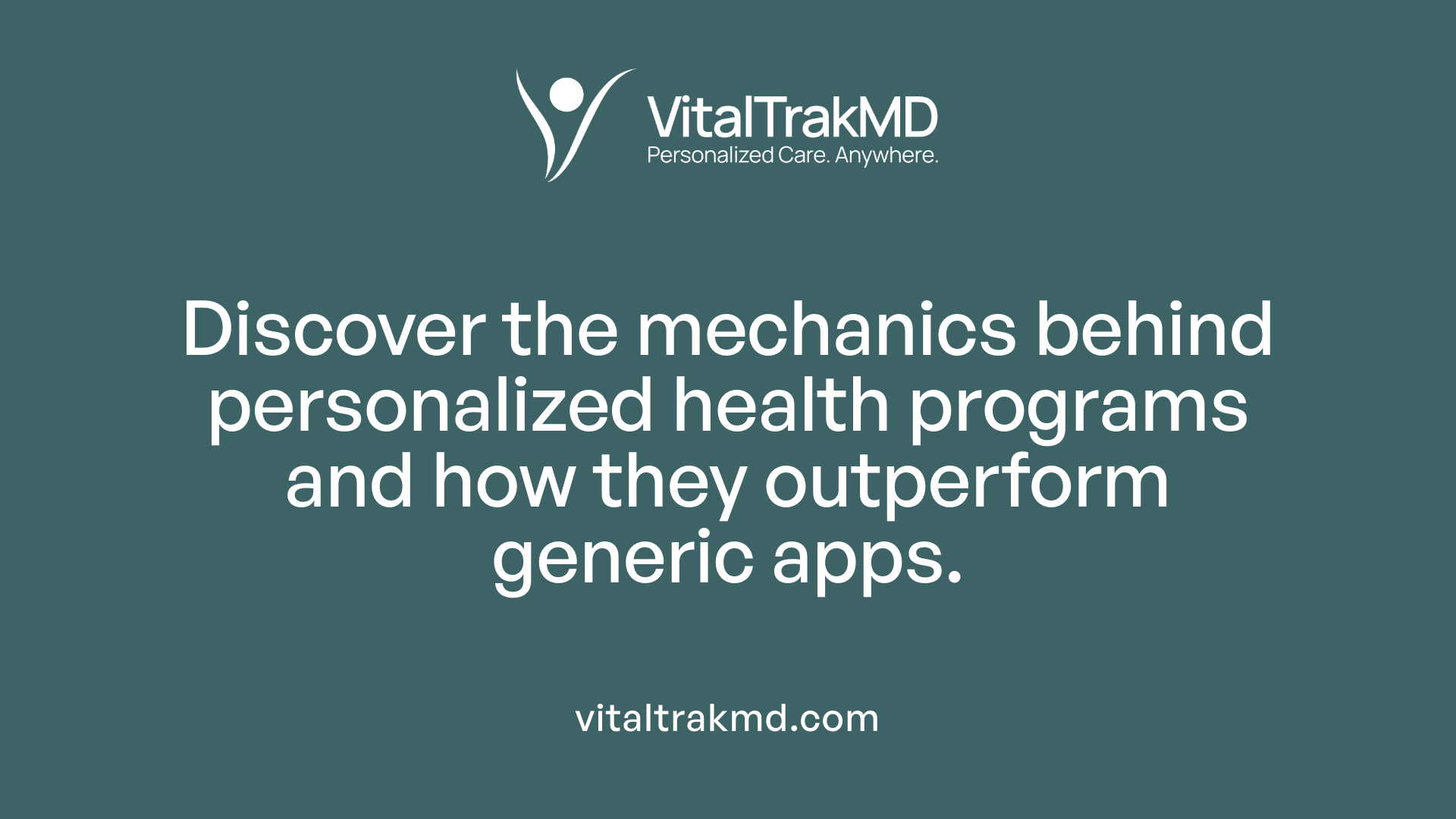
How do personalized health programs function as alternatives to generic wellness apps?
Personalized health programs are designed to tailor advice and interventions specifically to an individual's unique biological, genetic, lifestyle, and socio-psychological factors. Unlike traditional or generic wellness apps that offer one-size-fits-all recommendations, personalized programs analyze detailed user data to craft targeted health plans.
These programs utilize various data sources, including clinical measurements such as blood pressure, blood glucose levels, and body composition, as well as behavioral inputs like diet, physical activity, and stress levels. By integrating this information, they can identify specific health risks and customize interventions.
Recent studies highlight the effectiveness of these approaches. For instance, in a nine-week trial involving seniors with metabolic health issues, those receiving personalized lifestyle advice exhibited modest improvements in physical function, body fat, and motivation compared to those on generic guidance. Although the effects on overall health perception were limited, improvements in resilience and biological measures suggest personalized programs could promote more meaningful health outcomes.
Personalization often involves adaptive video exercises tailored to an individual’s abilities and progress, which support functional rehabilitation for those with disabilities. This personalized content fosters higher engagement and adherence by aligning with users' specific goals and conditions.
While evidence is still emerging, the overall consensus indicates that customized health interventions tend to evoke more significant benefits, such as better weight management, improved physical function, and increased confidence. These improvements are especially relevant for chronic disease management and long-term behavior change.
In sum, personalized health programs serve as more precise and potentially more effective alternatives to standard wellness apps by focusing on individual-specific data and needs, thus increasing the likelihood of successful health outcomes.
Advantages Over Traditional Wellness Apps
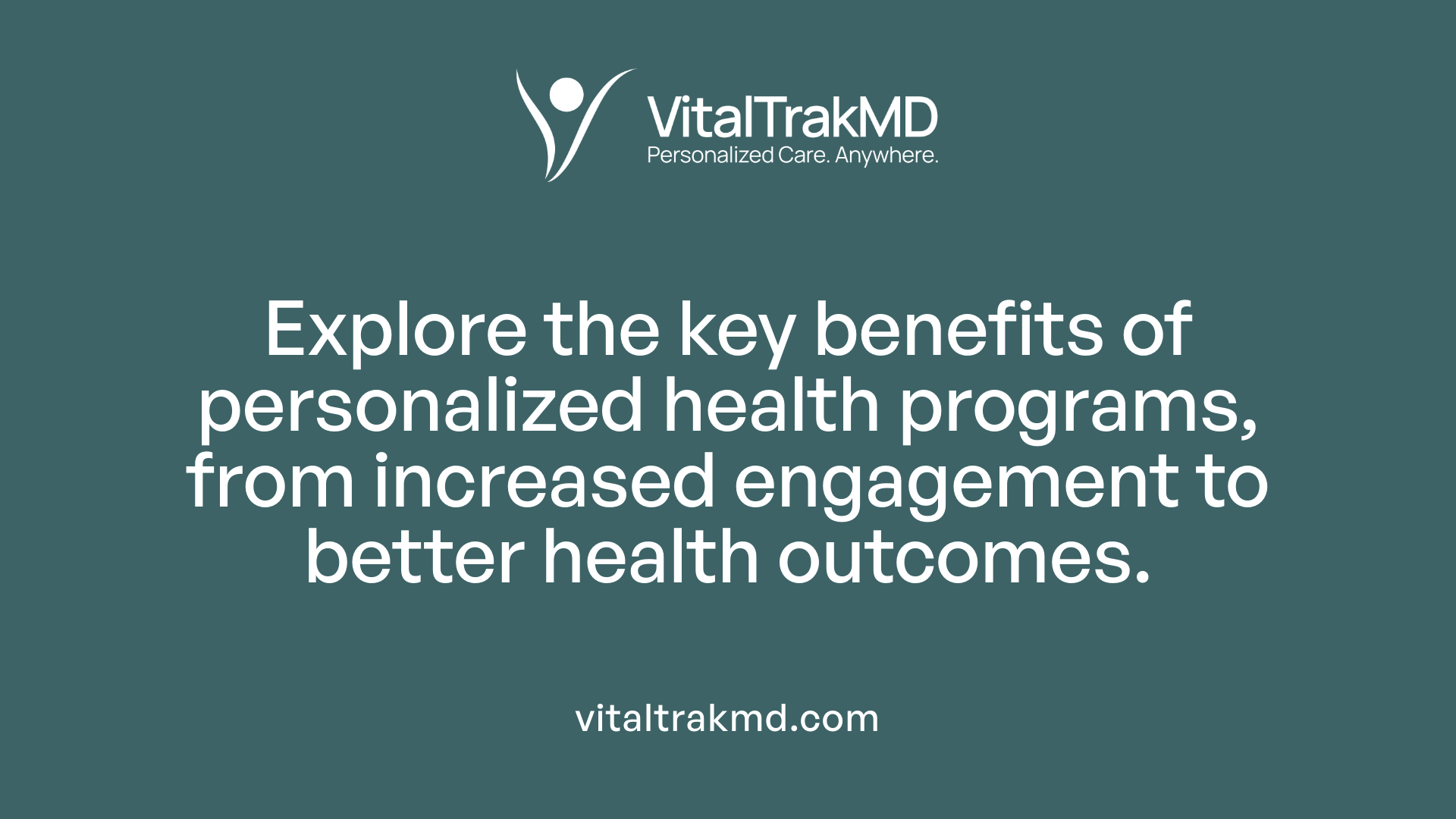
What are the benefits and advantages of personalized health programs over generic wellness apps?
Personalized health programs are transforming the landscape of health and wellness by delivering tailored interventions designed specifically for individual users. These programs consider personal health data, lifestyle variables, and individual goals to create customized experiences that outshine standard, one-size-fits-all wellness apps.
A primary benefit of personalized health programs is enhanced engagement and adherence. When users receive individualized feedback, motivational messages, and specific recommendations, they are more likely to stay committed to their health routines. For example, apps that tailor workout intensity based on a user's current fitness level and goals tend to have higher retention rates. The Nike+ Run Club app exemplifies this, as it adjusts workout plans in response to user progress and offers personalized tips and mindfulness suggestions.
Targeted health outcomes are another significant advantage. By focusing on individual conditions—such as cardiovascular health, diabetes management, or weight loss—personalized programs can more effectively address specific health issues. Studies on digital health interventions for cardiovascular management have shown that personalized apps can lead to better treatment adherence and health improvements.
Psychological benefits also play a crucial role. Personalization boosts motivation by making health management feel more relevant and attainable. When a user sees their milestones, receives encouraging feedback, or engages with customized challenges, it enhances their confidence and mental resilience. This sense of mastery and support fosters sustained engagement and reduces feelings of helplessness common in chronic disease management.
Moreover, personalization aligns with consumer preferences. Research indicates that 82% of customers value personalized experiences highly. Despite this, many healthcare providers and wellness companies admit that they are not meeting this demand, with 54% of consumers feeling their providers poorly personalize interactions. Personalization addresses this gap, making health management more customer-centric.
On a broader scale, these programs utilize advanced technologies, such as AI-driven insights, behavioral change techniques, gamification, and social features, to reinforce healthy habits. For instance, gamified elements—like challenges and rewards— motivate users to outperform their previous achievements, bolstering long-term adherence.
From a clinical perspective, targeted and personalized interventions can lead to improvements in physical and mental health. For example, personalized lifestyle advice based on metabolic measures and psychological factors has shown promise in initial studies with seniors, leading to slight enhancements in resilience, motivation, and reductions in body fat.
Cost-effectiveness is another advantage. Digital platforms allow healthcare providers to extend their reach beyond physical clinics, offering scalable solutions that can reduce costs related to in-person visits and hospital readmissions. These benefits are especially important in managing chronic conditions where continuous monitoring and support are crucial.
However, the success of personalized programs depends on careful data collection, privacy safeguards, and ensuring that customization aligns with user preferences and organizational capabilities. The integration of wearable devices and telemonitoring further enhances the personalization process by providing real-time data that informs individual interventions.
In conclusion, personalized health interventions offer a multitude of benefits over traditional wellness apps—improving engagement, achieving targeted health outcomes, and fostering psychological well-being. As technology advances and user expectations evolve, these tailored approaches are set to become the cornerstone of modern health and wellness management.
Technological Foundations of Personalized Care
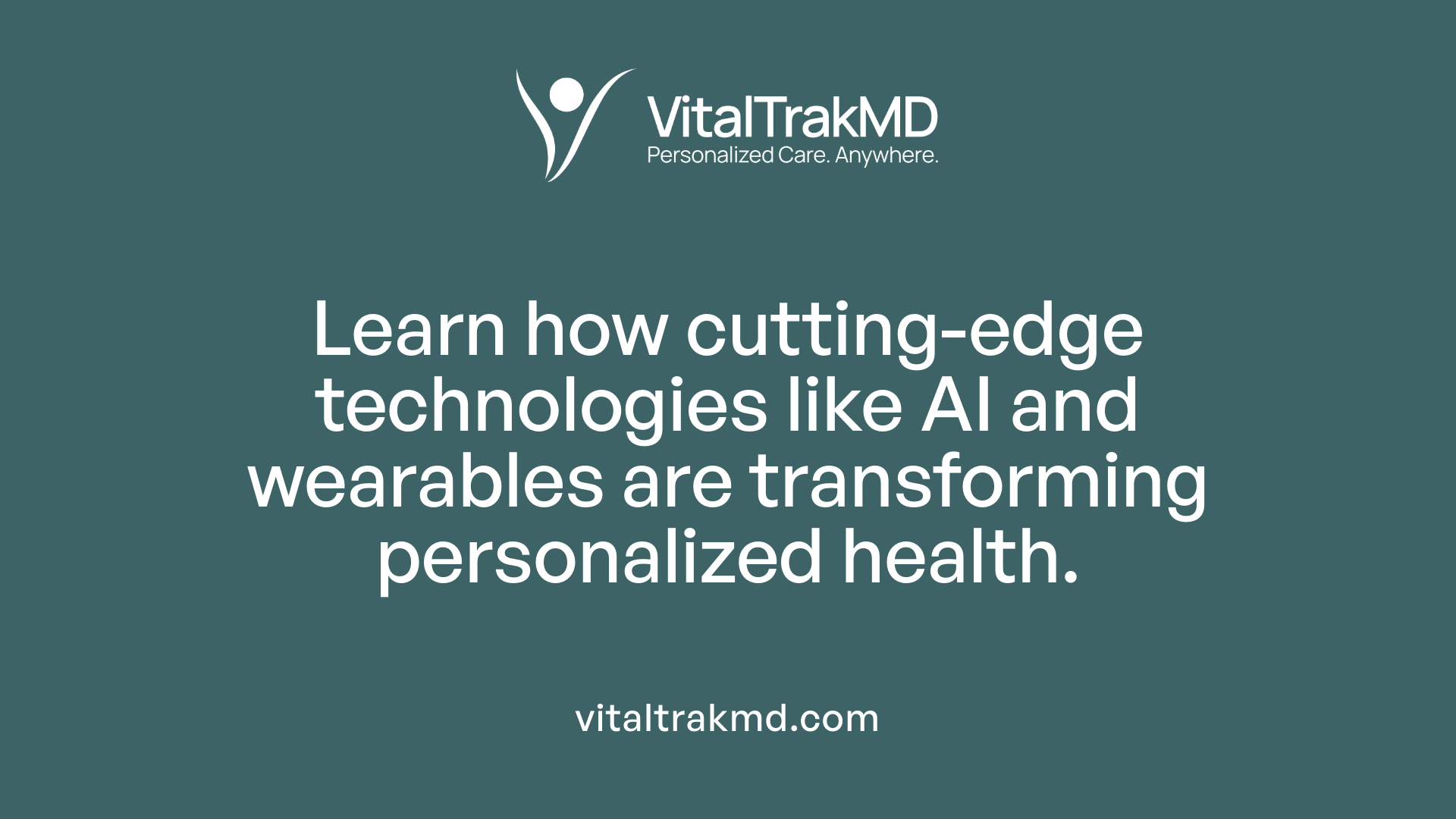
How do personalized health solutions differ from standard wellness applications in terms of features and technology?
Personalized health solutions stand out from typical wellness apps primarily through their use of cutting-edge technologies like artificial intelligence (AI), big data analytics, and the integration of wearable devices and sensors. While many standard wellness apps—such as those for mood tracking or relaxation—offer generalized features that aim to improve mental well-being or promote healthier habits, personalized health solutions utilize extensive data collection and analysis to customize interventions.
These solutions gather a broad range of information, including genetic data, phenotypic characteristics, lifestyle variables, and real-time health metrics from wearable devices. This comprehensive data enables them to generate tailored advice, monitor health parameters remotely, and adjust recommendations dynamically based on ongoing data inputs.
A significant distinction lies in regulatory compliance. Medical-grade personalized health apps often have to meet strict standards set by authorities like the FDA, ensuring safety, effectiveness, and data privacy. Conversely, many wellness apps operate with minimal regulatory oversight, focusing instead on user engagement and general health promotion.
Furthermore, advanced features in personalized health platforms include real-time monitoring, integration with electronic health records, predictive analytics for disease risk, and customization of health plans based on individual goals and conditions. This approach aims to improve patient engagement and clinical outcomes, a level of personalization seldom seen in standard wellness apps.
In sum, while standard apps may facilitate general health awareness or mood improvement, personalized health solutions harness sophisticated technological methods to deliver precise, individualized care that adapts to users’ evolving needs.
Impact on Health Outcomes and User Engagement
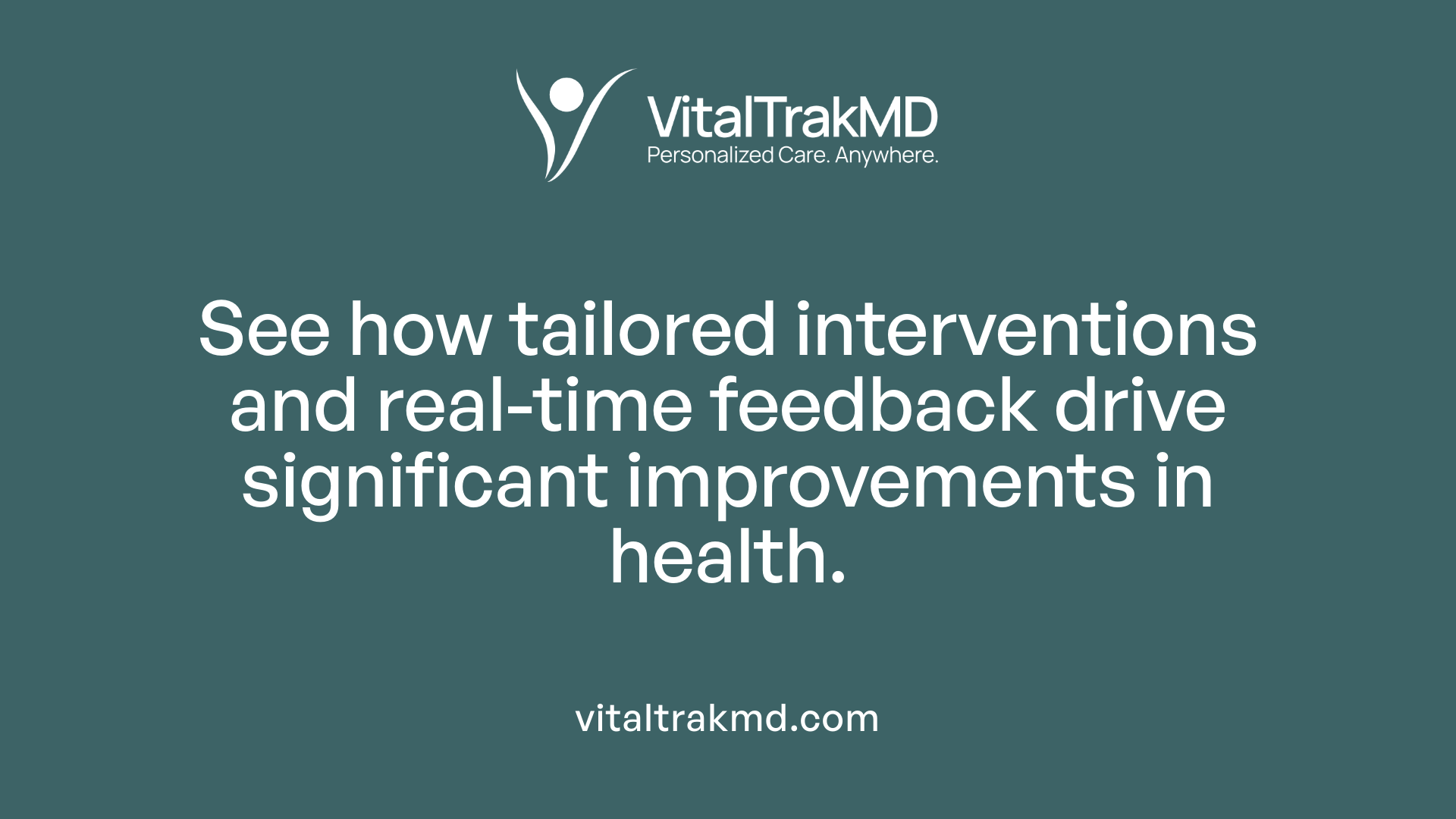
How do tailored interventions and feedback improve health outcomes?
Personalized health programs significantly enhance health outcomes by providing interventions that are specific to each individual's unique health status, lifestyle, and goals. Using data from wearable devices, mobile apps, and physiological measurements, these programs deliver customized feedback and recommendations that are more relevant and actionable. This targeted approach leads to better engagement in health behaviors, such as medication adherence, physical activity, and dietary changes.
For instance, apps that adjust workout plans based on users’ progress or blood glucose levels offer more effective guidance than generic advice. Additionally, tailored feedback fosters a sense of competence and motivation, increasing the likelihood of sustained behavior change. Research shows that when individuals receive health messages and interventions aligned with their personal data, they are more motivated to follow through and are more likely to experience improved health outcomes, including better cardiovascular health, weight management, and emotional well-being.
What is the role of real-time data and self-management in enhancing health?
Real-time data collection through smartphones, wearables, and sensors plays a crucial role by enabling continuous monitoring of health parameters such as heart rate, sleep patterns, and activity levels. This live data allows for immediate feedback, empowering users to make prompt adjustments in their self-care routines.
Self-management tools integrated into these technologies promote active participation in health maintenance. Users can track progress, recognize trends, and set personalized goals, which increases their sense of control and responsibility over their health. For example, apps like myFitnessCompanion® collect various data points to facilitate chronic disease management, while gamification elements—such as earning rewards for reaching activity milestones—boost ongoing engagement.
The immediate availability of data also helps identify issues early, prevent exacerbations, and optimize treatment plans through timely adjustments. In turn, this proactive approach can reduce hospital visits, improve disease control, and contribute to overall better health outcomes.
How does trust and health literacy influence the effectiveness of personalized health programs?
Building trust is essential for users to fully engage with personalized health interventions. Trust hinges on data security, privacy, and the accuracy of provided information. When users feel confident that their personal health data is protected, they are more likely to adopt and consistently use health apps and devices.
Health literacy also deeply impacts the ability to understand and act upon health information. Personalized programs that include easy-to-understand data visuals, simulations, and simplified messages help bridge knowledge gaps. For example, data-driven videos that show individual milestones improve understanding and motivate users by making complex health concepts accessible.
Furthermore, effective communication from health providers, evident through integration with apps and personalized messaging, reinforces trust and encourages regular use. As 82% of consumers value personalized experiences and 75% of patients desire deeper customization, healthcare providers and app developers must focus on transparent, clear, and user-friendly content. This ensures that users are better equipped to interpret their health data, adhere to recommendations, and ultimately achieve better health outcomes.
| Aspect | Benefits | Challenges & Considerations |
|---|---|---|
| Tailored Interventions | Improve adherence, enhance motivation, better health outcomes | Need for accurate data, user buy-in, and personalized content |
| Real-time Data & Self-Management | Early detection, proactive care, increased engagement | Data privacy issues, technology literacy, device costs |
| Trust & Health Literacy | Increased app uptake, sustained use, better understanding | Complexity of health info, privacy concerns, digital divide |
Personalization in health interventions—via precise feedback, real-time data analytics, and trustworthy communication—serves as a powerful strategy to elevate individual health trajectories and foster long-term user engagement. Incorporating these elements into mobile and digital health solutions promises a future where care is more effective, accessible, and user-centered.
The Role of Wearables and Data Collection
What is the role of wearable devices and patient-generated health data in personalized health initiatives?
Wearable devices are increasingly vital tools in personalized health strategies. They enable the continuous collection of biometric data such as heart rate, sleep patterns, stress levels, and activity metrics. This real-time, patient-generated data provides a detailed view of an individual’s health outside traditional clinical settings.
By leveraging this information, healthcare providers can design tailored interventions that respond directly to a patient's current physiological state. Early detection of potential health issues becomes more feasible, as deviations from personal health baselines can trigger alerts or prompt preventive action. Moreover, this data supports predictive analytics, helping to forecast health trends and anticipate future needs.
Wearable technology also facilitates a proactive approach to health management. For example, individuals can monitor their progress toward fitness or health goals, receive personalized feedback, and adjust behaviors accordingly. Apps linked with wearables incorporate these insights, providing customized recommendations aligned with personal health records.
However, integrating wearable data into healthcare systems requires robust infrastructure. Electronic Health Records (EHR) or Electronic Medical Records (EMR) systems must support secure, seamless data exchange through interoperable interfaces. This integration ensures the data enriches clinical decision-making without compromising patient privacy or data security.
Despite advancements, challenges remain. Standardizing data formats from diverse wearable devices is essential to ensure consistency and reliability. Additionally, addressing disparities in access to wearable technology is crucial to prevent widening health inequalities. Ensuring datasets are representative of diverse populations helps improve the accuracy and generalizability of personalized health insights.
In conclusion, wearable devices and patient-generated health data are transforming personalized medicine by enabling detailed, real-time monitoring and tailored interventions. Overcoming technical and ethical challenges will be vital to fully unlocking their potential and advancing equitable, effective healthcare.
Personalized Strategies in Disease Management
Can personalized health programs be used across specific health contexts such as cardiovascular health?
Personalized health interventions have demonstrated considerable promise in managing specific health conditions like cardiovascular disease. These programs leverage a variety of digital tools, including mobile health (mHealth) applications, text message (SMS) reminders, and telehealth platforms, to create tailored treatment approaches.
In cardiovascular management, personalized programs can improve treatment adherence and health outcomes by continuously monitoring vital signs such as blood pressure, heart rate, and cholesterol levels. For example, apps supported by wearable devices can capture real-time data, allowing physicians to adjust therapies proactively.
Advanced techniques like precision medicine adopt genetic and phenotypic information to customize interventions further. Digital twin technology—creating virtual models of patients—enables simulations of health risks and responses to different treatments, supporting individualized care plans.
Features such as medication reminders, lifestyle coaching, and behavioral nudges embedded in these programs promote healthier habits, reduce hospital readmissions, and lower the risk of adverse events. These interventions also facilitate ongoing patient engagement and feedback, which are critical for chronic disease management.
Research supports the effectiveness of these tailored interventions. Studies reveal that patients engaged with personalized digital health tools experience significant improvements, such as blood pressure control, weight management, and increased physical activity.
Overall, integrating personalized strategies with technological innovations offers a comprehensive approach to cardiovascular health, emphasizing prevention, early detection, and customized treatment—all pivotal in reducing disease burden and enhancing quality of life.
Data-driven and genetic approaches
Personalized health initiatives increasingly utilize data analytics and genetic insights to refine interventions. By analyzing a broad spectrum of data—including lifestyle factors, metabolic profiles, and genetic variants—healthcare providers can develop customized dietary, exercise, and medication plans.
Genetic testing can identify predispositions to certain conditions, enabling preventative measures and targeted therapies before symptoms manifest. For instance, patients with genetic markers linked to hypertension might receive specialized management plans, including personalized medication choices.
In addition, epigenetics research emphasizes how behaviors influence gene expression, highlighting the importance of lifestyle modifications tailored to individual genetic makeup. As a result, personalized nutrition and fitness plans are emerging, designed to optimize health outcomes based on a person’s unique genetic and epigenetic data.
Proactive health management
Proactive health management revolves around early detection, continuous monitoring, and personalized interventions to prevent disease progression. Mobile health apps, wearables, and telehealth solutions enable patients to track their health metrics diligently and receive immediate feedback.
This approach supports the shift from reactive treatment—addressing illnesses after they emerge—to preventive and proactive care that anticipates health risks and intervenes early.
For example, in cardiovascular disease, proactive management includes regular blood pressure monitoring, risk stratification based on individual data, and lifestyle coaching aimed at reducing modifiable risk factors.
Moreover, health data analytics can identify patterns and predict health events, prompting timely interventions. Personalized alerts can notify patients about abnormal readings, prompting them to seek care before a crisis occurs.
Such strategies not only improve health outcomes but also reduce healthcare costs by preventing hospitalizations and long-term complications.
| Aspect | Approach/Technology | Benefits |
|---|---|---|
| Disease Focus | Cardiovascular, metabolic, neurological, and more | Targeted management and prevention |
| Data Utilization | Genetic data, real-time health metrics, lifestyle variables | Customized treatment plans |
| Tools & Devices | Wearables, mobile apps, telehealth platforms | Continuous monitoring, engagement, and feedback |
| Underlying Principles | Prevention, early detection, behavioral change support | Improved adherence, reduced morbidity |
| Impact | Enhanced patient outcomes, reduced healthcare costs | Proactive, efficient, personalized health strategies |
The future of disease management lies in seamlessly combining data-driven insights, genetic information, and patient-centered care to offer highly personalized, proactive health solutions tailored to individual needs.
Personalization's Role in Mental and Physical Wellness
How do personalized health strategies differ from or replace standard wellness applications in health promotion and disease management?
Personalized health strategies differ significantly from conventional wellness apps, primarily through their tailored approach to each individual's unique health profile. Standard apps often provide generic advice, generic reminders, and broad health tips that aim to serve a wide audience. In contrast, personalized health interventions take into account detailed personal data, such as medical history, genetic information, lifestyle habits, and real-time health metrics.
These strategies use data collected via wearable devices, health records, and self-reported inputs to craft customized plans. For example, a personalized app might adjust exercise difficulty based on physiological feedback or modify dietary recommendations according to genotypic information, thereby increasing relevance and effectiveness.
In some cases, personalized approaches can entirely replace traditional wellness applications, especially for individuals with chronic illnesses or those at high risk. These tailored solutions offer more precise guidance, improved engagement, and better health outcomes by addressing specific needs rather than providing one-size-fits-all advice.
Overall, tailored health strategies aim to enhance health promotion and disease management by making interventions more relevant, dynamic, and patient-centered, ultimately leading to more successful health behavior changes and improved disease control.
Emerging Trends and Effectiveness of Personalization
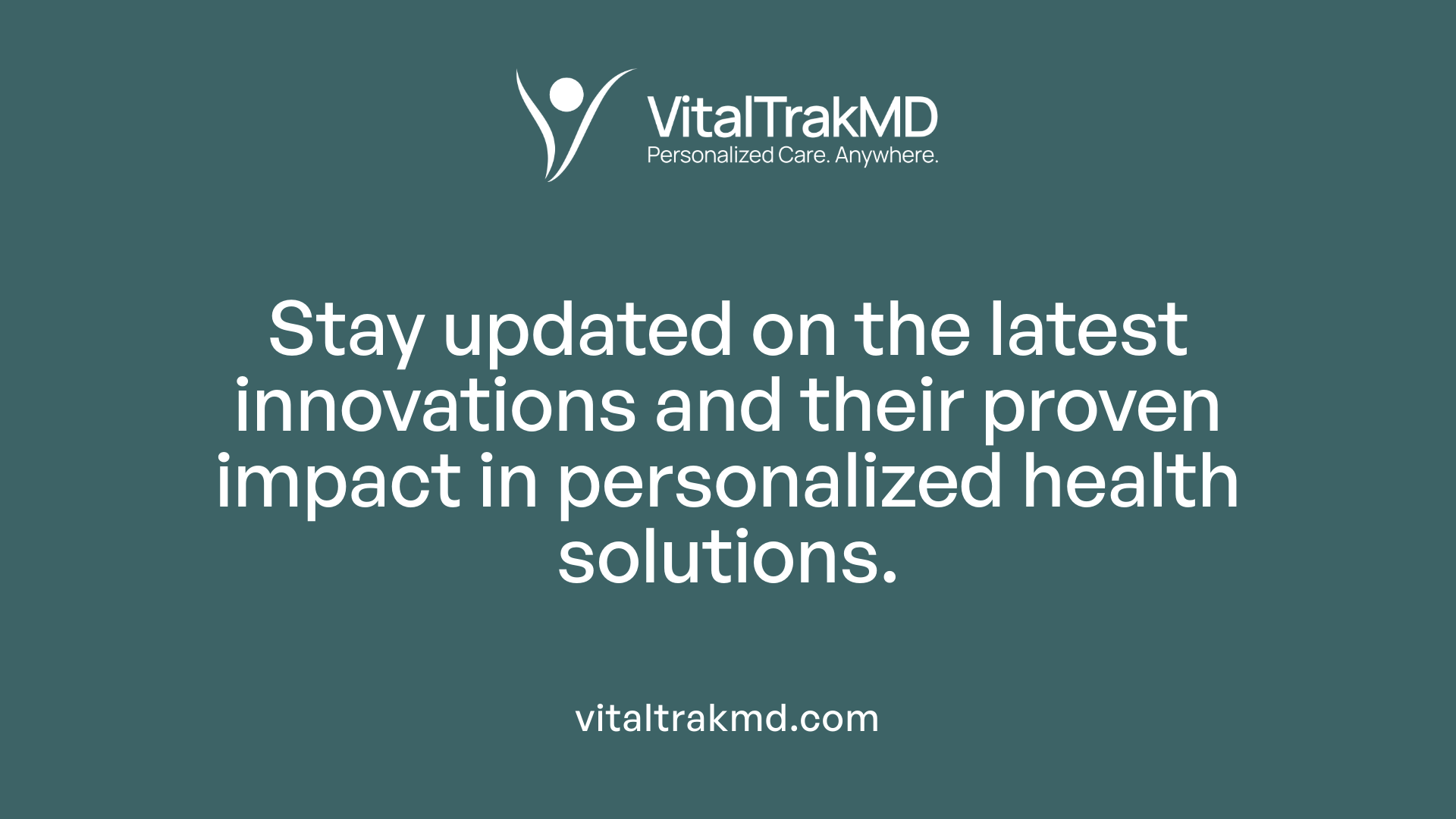
What are the current trends and techniques in personalized health versus generic wellness apps, and how effective are they?
Recent developments in personalized health applications have markedly shifted towards integrating advanced technologies like artificial intelligence (AI), machine learning, and wearable devices. These innovations enable apps to offer tailored health recommendations, real-time monitoring, and dynamic engagement features such as virtual coaching, gamification, and personalized videos. For instance, apps like Nike+ Run Club and those employing data-driven content adapt their guidance based on individual progress, preferences, and physiological data.
Compared to traditional, one-size-fits-all wellness apps, these personalized solutions demonstrate higher effectiveness in motivating users, maintaining engagement, and facilitating behavioral change. The use of targeted feedback, customized challenges, and adaptive goal-setting makes them more responsive to individual needs. Moreover, sophisticated personalization strategies include content customization based on behavior change theories, socio-psychological factors, and biological measures, which enhance perceived relevance and effectiveness.
Cultural and social influences substantially affect app utilization and outcomes. In collectivist societies such as China and Singapore, social features and group-based interventions boost collective engagement and success. Conversely, in more individualistic cultures like the U.S., personalized content aimed at individual goals tends to yield moderate effectiveness. Studies show that when health apps are culturally adapted and include local language, norms, and societal values, their adoption and impact improve significantly.
Case studies reinforce these trends. For example, NHS campaigns utilizing personalized videos have successfully motivated health milestones, and Weight Watchers' loyalty programs leveraging individual recaps and rewards have increased long-term retention. In workplace settings, AI-powered wellness platforms like Vantage Fit, combining personalization with gamification, have reported improvements in employee health metrics, reduced healthcare costs, and greater participation.
However, the success of these personalized strategies is not uniform. The overall impact hinges on the quality of implementation, user trust, and privacy safeguards. Apps must prioritize data security and offer transparent personalization mechanisms to sustain user confidence.
How do the technological, cultural, and outcome aspects of health app personalization interplay?
| Aspect | Influence | Examples |
|---|---|---|
| Technological | Enables real-time data collection, adaptive algorithms, and interactive content | Wearable sensors, AI analytics in Vantage Fit, personalized videos |
| Cultural | Shapes app design, content language, social features, and engagement methods | Group challenges in collectivist societies, localized health advice |
| Outcomes | Defines effectiveness, adherence, motivation, and health improvements | Increased physical activity, reduced body fat, improved mental health scores |
Successful personalization involves balancing these factors to deliver culturally relevant, technologically advanced, and outcome-oriented interventions.
In summary, personalization in health apps is evolving rapidly, leveraging AI and wearable technology to outperform generic solutions. Its success depends on culturally sensitive design, technological robustness, and demonstrable health benefits, fostering a more engaging and effective digital health landscape.
Suitability and Cost-effectiveness
How suitable are personalized health programs for addressing individual health needs?
Personalized health programs are particularly well-suited to meet individual health requirements because they utilize detailed data on a person’s molecular makeup, physical health, and behavior. Technologies such as genetic testing, wearable monitoring devices, and sophisticated AI systems allow for precise assessment of health risks and the development of unique treatment strategies tailored for each patient.
These programs promote active participation through shared goal setting, personalized feedback, and self-assessment tools. This engagement encourages adherence to health plans and increases patient satisfaction, as individuals feel their care is specifically designed for their unique circumstances.
Moreover, personalized health initiatives enable early risk detection and preventive measures. By identifying potential issues before they develop into serious conditions, these programs can effectively reduce hospital admissions and lower overall healthcare costs.
In essence, personalized health programs adopt a patient-centered approach. They foster an environment where interventions are precisely aligned with individual needs, leading to better health outcomes, higher satisfaction, and more efficient healthcare delivery.
Implementation Challenges and Considerations
What are the challenges in implementing personalized health programs?
Integrating personalized health interventions into mainstream healthcare systems involves navigating several significant obstacles. One of the primary concerns is data privacy and security. These programs rely on detailed personal health information, including biometric data, medical history, and lifestyle variables. Ensuring this sensitive data remains protected from breaches and unauthorized access is critical to maintaining user trust and complying with legal standards like HIPAA.
Another major challenge relates to the regulatory framework and standards. As these digital solutions evolve rapidly, developers and healthcare providers must adhere to complex regulations, such as FDA approvals and medical device classifications. These guidelines are essential for ensuring safety and efficacy but can also hinder swift innovation due to lengthy approval processes and unclear standards for emerging technologies like AI-driven wellness apps.
Furthermore, user trust and health literacy significantly influence the success of personalized health programs. Many users are skeptical about data security or lack the knowledge needed to interpret health data effectively. This gap can impede adoption, especially among populations with limited digital literacy or lower socioeconomic status.
How do these challenges impact the integration of personalized health solutions?
These barriers can slow down the deployment of innovative interventions, limit user engagement, and exacerbate health disparities. For example, if users lack confidence in data privacy measures, they may refrain from using health apps altogether.
To address these issues, stakeholders must develop transparent data management policies, invest in user education, and design inclusive solutions that accommodate diverse populations. Implementing robust cybersecurity measures and achieving compliance with evolving standards ensures that technological advances do not outpace safety protocols.
The importance of collaboration and strategic planning
Overcoming these challenges requires a collaborative effort among technology developers, healthcare providers, regulators, and patients. Clear communication about data use, benefits, and risks builds trust. Strategic planning involves establishing standardized protocols for data sharing, certification processes for apps and devices, and creating accessible platforms that enhance health literacy.
By fostering such partnerships and emphasizing patient-centered design, healthcare systems can better integrate personalized programs, ultimately improving treatment adherence, health outcomes, and patient satisfaction.
| Challenge | Impact | Potential Solutions |
|---|---|---|
| Data Privacy and Security | Deterrent due to fear of breaches | Implement advanced encryption, transparent privacy policies, and regular security audits |
| Regulatory Compliance | Lengthy approval processes | Develop clear guidelines for digital health tools, streamline regulatory pathways, and encourage innovation |
| User Trust and Literacy | Low adoption and engagement | Promote educational initiatives, simplify user interfaces, and ensure inclusivity |
In conclusion, addressing these challenges through proactive strategies and cross-sector collaboration is essential for the successful implementation of personalized health programs, leading to more effective and equitable healthcare delivery.
The Future of Personalized Health
What does the future hold for personalized health programs and their integration into healthcare?
Personalized health programs are on the cusp of transformative growth, promising to revolutionize healthcare delivery. Their integration into national health systems is expected to become more seamless, enabling a shift from reactive treatment to proactive, predictive, and preventive care.
Advances in artificial intelligence (AI), big data analytics, and biometric technologies are central to this evolution. These tools allow for in-depth analysis of individual genetic, phenotypic, and lifestyle data, creating tailored health interventions. For example, AI algorithms can identify early signs of disease, recommend personalized lifestyle modifications, and optimize treatment plans.
Interoperability is a significant focus, with standards being developed to facilitate smooth data exchange between different health platforms. This enhances the ability of healthcare providers to access comprehensive patient information in real-time, leading to coordinated and efficient care pathways.
Policy and ethical considerations are also critical in shaping this future. Concerns around data privacy, security, informed consent, and equitable access need to be addressed. Frameworks are being proposed to ensure that personal health data is protected while enabling innovation.
Emerging technologies like digital twins—virtual models of individuals—offer promising possibilities for simulation and prediction of health outcomes, allowing for highly personalized preventive strategies.
Furthermore, AI-driven predictive models are expected to enhance early disease detection, allowing interventions before symptoms develop and potentially reducing the burden of chronic diseases.
Overall, these advancements will enable a more patient-centered approach, where healthcare is customized based on each individual’s unique biological and behavioral profile. This will not only improve health outcomes but also make healthcare more accessible and efficient.
As policies evolve and technology advances, the integration of personalized health into mainstream healthcare is poised to become a cornerstone of modern medicine, guiding a future where health management is precise, predictive, and increasingly personalized.
Embracing a Tailored Future in Health and Wellness
As digital health solutions evolve, personalized health programs are positioned as the future of effective, engaging, and patient-centered healthcare. By leveraging cutting-edge technology, comprehensive data analysis, and user-specific interventions, these programs outperform traditional wellness apps in promoting health, managing diseases, and fostering sustained behavioral change. Overcoming implementation challenges through robust privacy measures, regulations, and inclusive design will be pivotal. The integration of personalized strategies into broader healthcare frameworks promises a more equitable and efficient health system, ultimately empowering individuals to achieve better health outcomes and a higher quality of life.
References
- A Systematic Review of Personalized Health Applications through ...
- Personalization in Health and Wellness: Top 7 Digital Trends - Idomoo
- Effective Personalization in Health & Fitness Apps Demands ...
- The Effectiveness of Digital Apps Providing Personalized Exercise ...
- Beneficial effect of personalized lifestyle advice compared to generic ...
- Designing personalised mHealth solutions: An overview
- (PDF) Personalised mobile health and fitness apps - ResearchGate
- Mobile applications, physical activity, and health promotion
- Older Adults Not Taking Full Advantage of Health and Wellness Apps
- 18 Best Online Medical Apps That Make Personal Health Easier
Recent articles
Want to Feel Better and Live Healthier?
Join hundreds of patients taking control of their health with personalized care that fits their life – not the other way around.
Rated 4.8/5 by 32+ customers







